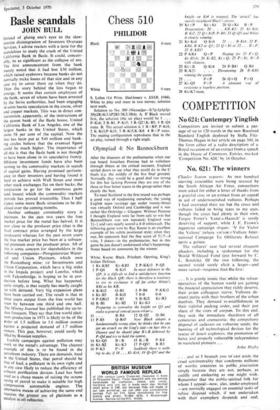Basle scandals
JOHN BULL
Instead of gluing one's eyes to the slow- motion disintegration of Investors Overseas Services, [advise readers with a taste for the scandalous to study the crash of the United California Bank in Basle. It could, conceiv- ably, be as significant as the collapse of los. The first announcement from the bank merely noted that it had lost $30 million, which raised eyebrows because banks do not normally make losses of that size and in any case try to cover them up when they do. Then .the story behind the loss began to emerge. It seems that certain employees of the bank, seven of whom have been arrested by the Swiss authorities, had been engaging in some hectic speculation in the cocoa, silver and copper markets. This was in direct con- travention, apparently, of the instructions of the parent bank of the Basle house, United California Bank of Los Angeles, one of the largest banks in the United States, which owns 58 per cent of the capital. Now the loss has been put at $40 million and bank- ing circles believe that the eventual figure could be much higher. The importance of all this is that the Basle bank is not thought to have been alone in its speculative frenzy. Offshore investment funds have also been turning to the commodity markets in search of capital gains. Having promised perform- ance to their investors and having found it hard to achieve with Wall Street and most other stock exchanges flat on their backs, the temptation to go for the enormous gains (and losses) which the commodity markets provide has proved irresistible. Thus I half expect some more Basle situations to be dis- closed over the coming months.
Another unhappy commodity story is platinum. In the past two years the free market price for the metal has halved. It is now close to the producer price (that is the fixed contract price arranged by the large producers) whereas for the past seven years the free market price has been at a substan- tial premium over the producer price. All of this is some concern for shareholders in the following companies-.-Potsgietersrust Water- val and Union Platinum, which own the Rustenburg mine: tic Investments and Union Corporation, which have a big stake in the Impala project: and Lonrho, which with Falconbridge, is hoping to be in pro- duction before long. What has happened, quite simply, is that supply has nearly caught up with demand. Very big expansion plans
have been carried out. The result is that in three years output from the free world has risen by between one third and one half.
The Alining Journal has published the up-to- date forecasts. They say that free world plati-
num production in 1971 is likely to be of the order of 1.5 million to 1.6 million ounces against a projected demand of 1.7 million ounces. This gap, however, could easily be filled by Russian supplies. Luckily campaigns against pollution may work to the metal's advantage. The clearest ■ example of this is to be found in the Petroleum industry. There are demands, loud in the United States, that petrol should be free of lead, a pollutant in its own right and in any case likely to reduce the efficiency of exhaust purification devices. Lead has been used as a cheap means of raising the octane rating of petrol to make it suitable for high
compression automobile engines. The alternative means of achieving the same end requires the greater use of platinum as a catalyst in oil refineries.






































 Previous page
Previous page